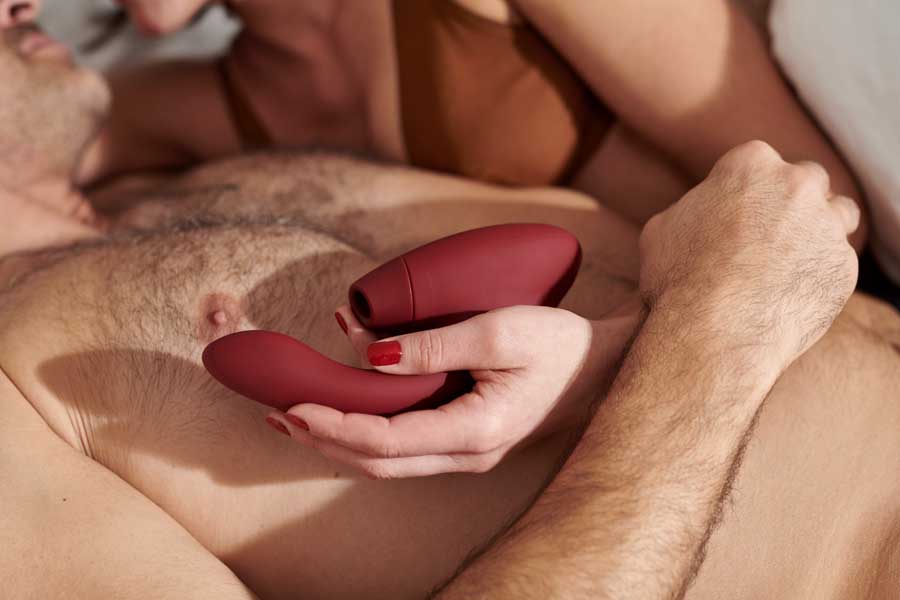As a passionate lovemaking session *cums* to an end, peeing after sex is probably the last thing in your mind. You’re probably thirsty and are thinking of grabbing some soda, or maybe you prefer staying on the bed and cuddle with your partner.
But girl, you need to get up! Before cuddling your boo, take the loo first.
“Come on, I’m still relaxing here… Is that even important?”
Well, it sorta does. Peeing after sex is a helpful practice of taking your sexual health. By doing this, you’re reducing the risks of getting bacterial infections and other unnecessary mishaps.
To explain further, here’s a quick guide as to why peeing after sex is essential. We’re also going to dive in about one of the repercussions of not urinating after sex—Getting UTI or Urinary Tract Infection.
Why Peeing After Sex is Important
During sex, various fluids are all over your vulva (the external part of your genitalia). It usually contains bodily secretions and oils that may contain harmful bacteria.
As your boyfriend starts pumping in and out your coochie, he’s unintentionally rubbing these fluids into your urethral opening, reaching your urethra— the tube that connects the bladder to the urethral opening.
And since women have a shorter urethra compared to men, the harmful bacteria can easily reach the bladder. The next thing you know, you’re already experiencing some symptoms of UTI.
This is why doing preventive measures is a must, such as peeing after sex. It will flush out the harmful bacteria before it reaches your bladder, saving you from bacterial infections.
What is UTI?
Since we’ve mentioned this above, you’re probably wondering what UTI is.
Urinary Tract Infection (UTI) is a bacterial infection that harms your urinary system, including your urethra, ureters, bladder, and kidneys. It often causes an infection in the lower urinary tract, such as the bladder and the urethra.
This infection usually hits women more than men. In fact, women are up to 30 times more likely to get a UTI than males.
Symptoms
Some people may get this infection without symptoms, but when it does, it may include the following signs:
- Frequent urination
- Burning sensation when urinating
- Strong-smelling urine
- Passing frequent, small amounts of urine
- Cloudy or reddish urine
- Pelvic pain or pressure
If the symptoms persist or worsen, consult your healthcare provider immediately. Ignoring these signs may turn a minor UTI into a serious blood or kidney infection.
Treatment
Fortunately, this infection is curable. You just need to set up an appointment with your doctor for a checkup. At the clinic, your doctor will take a urine sample to confirm if you have the infection. If confirmed, you will need to wait for a few days as they determine the type of bacteria that has infected your system.
Once they’ve found the type of germs that have caused your infections, the doctor will prescribe you the antibiotics that would kill that type of bacteria and treat you from this infection.
Get those meds and take them as instructed. As long as you diligently follow the prescribed dosage and schedule, you’ll recover without a hitch.
Other Ways to Prevent UTI (Aside from Peeing After Sex!)
With our quick refresher above, we hope you’d now understand why peeing after sex is a big deal. It’s not just some annoying post-sex regimen. It will save you from health complications and costly medications.
Now, to further reduce your risks, here are other practices that you should be doing too.
1. Practice good hygiene.
Wash your vulva regularly with mild soap and water. Also, consider you’re the material of undergarments too. Go for a breathable material such as cotton.
2. Drink plenty of water.
Urinating regularly keeps your urethra free from harmful bacteria. To ensure that, you must keep yourself well-hydrated. In that way, you’ll be able to urinate without a hitch and besides, how will you pee if there are no fluids in your system?
3. Avoid drinking fluids that could irritate your bladder.
We’re not saying that you should stop living your life and avoid drinking other types of drink, but just take everything in moderation. Just be careful in your intake with the following: Alcohol, citrus juices, caffeinated drinks, and spicy foods.
4. Avoid using irritating feminine products.
Before trying out that trendy coochie cleanser, check the label first. Feminine products such as intimate washes, vaginal cleansers, intimate wipes, vaginal sprays, vaginal douches, and intimate creams may include ingredients that can irritate your intimate area. Some ingredients such as Sodium Lauryl Sulfate, Phthalates, and synthetic fragrances can also remove good bacteria in your vagina, making you more prone to infections.
5. Check and change your birth control if needed.
If you’re using contraceptives that involve spermicides, consider changing into a different type of birth control for women. Why? Because spermicides contribute to bacterial growth, increasing your risks of getting UTI.
6. Always use a water-based lubricant during sex.
Steer away from silicone-based and oil-based lube. Just like spermicides, it can contribute to bacterial growth and may increase your chances of getting infections.
7. Holding your pee is a no-no.
Remember, your urine is a waste product. The more you hold it in, the more chances it can irritate your bladder. That’s why you need to keep peeing and get those bodily waste out of your system.
Frequently Asked Questions
With all the information that you’ve learned with this guide, we hope you’ve fully understood why this practice is beneficial to your health. But if you still have questions about this practice, check out our FAQ below.
1. Should men pee after sex too?
As for men, it’s not necessary to pee after sex. Compared to women, their urethra is much longer, making it harder for the bacteria to travel into the bladder.
2. How soon should I pee?
There’s no rush—no need to be sprinting in the bathroom after climax. Just make sure to take the loo in a reasonable time.
3. What if I don’t feel like peeing?
If peeing seems like a challenge, here’s what you can do:
- Chug some H20. Drinking at least half or a whole glass of water after sex will surely help. The more you drink, the more your bladder stretches and makes you feel like peeing.
- Sit on the toilet for a few minutes. Waiting for a few minutes may relax your bladder and release its waste.
- Go for audio or visual cues. Look for content that can stimulate the bladder, such as video/audio of running water and waterfalls.
4. Does peeing after sex prevent pregnancy?
If you’ve engaged in unprotected sex, peeing after sex won’t help you prevent pregnancy. Urine is released from the urethra and not from the vagina, so urinating will only flush the bacteria that’s in your urethra.
The only thing you can do about it is to take emergency birth control methods, such as the morning-after pill.
5. Can I flush out sexually-transmitted infections (STIs) through peeing?
Nope, peeing can only remove the UTI-causing bacteria. Bacteria from sexually-transmitted infections are absorbed through tiny tears in your mucus membranes—urination won’t stop this absorption process.
The only way to protect yourself from STIs and STDs is to use regular or female condoms during sex. Also, don’t forget to get screened regularly.
6. Should I pee even after non-penetrative activities?
If you’re doing sexual activities that don’t involve your vulva in any way, then it’s okay to not pee after sex. However, if your vulva is still involved, such as oral sex (cunnilingus), it’s better to still do this preventive practice.
Any sexual activity that has can spread bacteria towards your urethral opening, whether it’s penetrative or non-penetrative, can still cause UTI.
7. Should I pee after masturbating?
Just what I’ve mentioned above, any sexual activity that has the potential to push bacteria towards your urethra can still cause UTI.
With that, make sure your sex toys and hands are spotlessly clean and to urinate after the deed.
Conclusion
Peeing after sex is a simple yet effective approach to prevent bacterial infections. It flushes out the unnecessary waste in your body and keeps your urinary system healthy.
Take note though, this is not the surefire way to prevent UTI. You need to do other preventive measures too such as drinking plenty of water and taking the bathroom regularly.
We hope you’ll take note of this preventive practice. Now, go and have fun!


